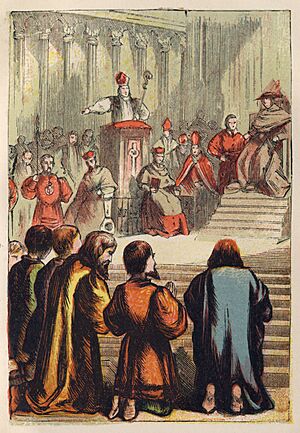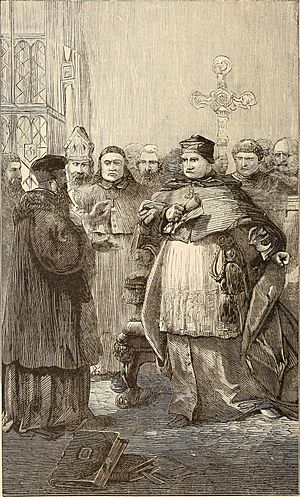Robert Barnes (martyr) facts for kids

Robert Barnes (born around 1495 – died 30 July 1540) was an important English reformer. He was also known as a martyr, meaning he died for his beliefs.
He lived during a time of big changes in England, known as the English Reformation. This was when the Church in England separated from the Pope in Rome.
Contents
Robert Barnes' Early Life
Robert Barnes was born in King's Lynn, Norfolk in 1495. He went to school in Cambridge. There, he became a Roman Catholic priest with the Augustinian Friars.
After 1514, he studied in Leuven, a city in Belgium. He came back to Cambridge in the early 1520s. In 1523, he earned a special degree called Doctor of Divinity. Soon after, he became the leader of his Cambridge convent.
Speaking Out in Cambridge
John Foxe, a famous writer, said that Barnes was part of a group in Cambridge. These men met at the White Horse Tavern. They would read the Bible and talk about religious ideas.
In 1525, Barnes gave a sermon on Christmas Day at St Edward's Church. He spoke against fancy church leaders and unfair church practices. While speaking, he saw a churchwarden who had put a local man in prison.
Barnes then spoke out against Christians suing each other. This was a bold move, especially in a church connected to Cambridge University's law school. At this time, King Henry VIII was trying to stop people from bringing Martin Luther's books into England. Barnes' words made people suspicious right away.
Facing Trouble and Escaping
In 1526, Barnes was called before the vice-chancellor. He was accused of preaching a heretical sermon, meaning it went against church teachings. He was questioned by Cardinal Wolsey and four other bishops.
Barnes was told to take back his words or be burned. He chose to take back his words. He was then sent to the Fleet prison. Later, he was allowed to go to the Austin Friary in London, but he was still under house arrest.
While there, it was found that Barnes was secretly giving out illegal copies of William Tyndale's Protestant Bible.
Life in Exile and Return
In 1528, Robert Barnes escaped to Antwerp, a city in Belgium. He also visited Wittenberg in Germany. There, he became good friends with Martin Luther, who started the Protestant Reformation.
In 1531, Barnes was asked to find out what Luther thought about King Henry VIII's plan to divorce Catherine of Aragon. That same year, Barnes wrote a book called A Supplication. This book explained Lutheran theology and was an appeal to King Henry VIII.
Stephen Vaughan, an agent for Thomas Cromwell, read Barnes' book. He was very impressed and asked Cromwell to invite Barnes back to England.
Barnes returned to England in late 1531. He became an important link between the English King and the Lutheran German states. For several years, he traveled between England and Germany.
Political Changes and Danger
Barnes strongly supported King Henry's idea of the King controlling the Church. He hoped this would lead Henry to choose Lutheranism for the Church of England.
In 1539, Barnes helped with talks for King Henry to marry Anne of Cleves. This plan was Cromwell's idea. However, Henry VIII had already decided not to fully accept Lutheranism.
Then came the Six Articles law in 1539. This law made many Protestant beliefs illegal. Soon after, Henry's marriage to Anne of Cleves was ended. These events led to the downfall of Cromwell and others who supported his plans, including Barnes.
Final Days and Execution
Barnes spoke out against Bishop Stephen Gardiner in a sermon. This started a big conflict among the King's advisors in 1540. Barnes was forced to apologize and take back his words. Bishop Gardiner then gave his own sermons.
A month later, Cromwell became a powerful earl. Bishop Sampson, a friend of Gardiner, was sent to the Tower of London. Barnes openly went back to supporting Lutheranism. But this victory did not last long.
In July, Cromwell was accused of treason and lost his power. The King's marriage to Anne of Cleves was ended. Barnes was found guilty of heresy and sentenced to be executed by burning.
On 30 July, 1540, Barnes and five other religious people were taken from the Tower of London to Smithfield. They were to be executed. Each cart carried both a Lutheran pastor and a Catholic priest.
Robert Barnes and two other Lutheran pastors, William Jerome and Thomas Gerrard, were burned at the stake. They were executed for heresy under the Six Articles. At the same time, three Catholic priests were also executed. They were Fr. Thomas Abel, Fr. Richard Fetherstone, and Fr. Edward Powell. They were executed for disloyalty to the King, because they did not accept King Henry as the head of the Church.
Robert Barnes' Legacy
People across Europe, both Catholics and Lutherans, were shocked by these executions. Some historians believe Barnes helped English Protestants and Catholics understand the big changes of the English Reformation.
Every year, Robert Barnes and his two companions are remembered on the Lutheran Calendar of Saints.
The three Catholic priests executed with Barnes were later honored by Pope Leo XIII in 1886.
Literature About Robert Barnes
- Soon after their deaths, a poem was published called The Metynge of Doctor Barnes and Dr. Powell at Paradise Gate.
- Martin Luther published Barnes' own statement of faith in a book called Bekenntnis des Glaubens (1540).
- Robert Barnes also appears in The Mirror & the Light, a novel by Hilary Mantel.
See also
- St Edward's Passage
 | Bayard Rustin |
 | Jeannette Carter |
 | Jeremiah A. Brown |


